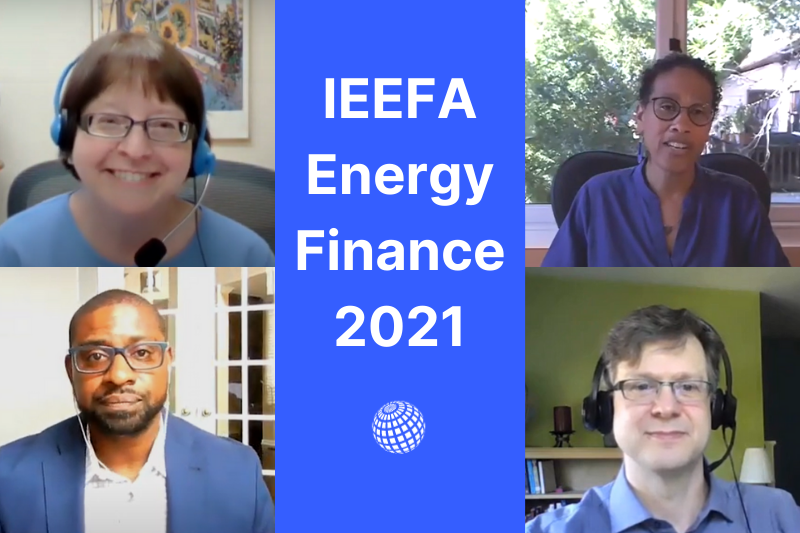IEEFA Energy Finance Online Conference 2021
June 14 - June 25, 2021

Two Energy Economies, One World – June 14
The hallmark of the global energy transition is the competition between fossil fuels, which have powered the world economy for decades, and rising alternative energy resources like wind, solar, and electric vehicles. How fast will change take place, what direction will it take, and what are the primary drivers of and impediments to change? Where do the competitive edges lie in the markets for electricity, transportation and petrochemicals?
Keynote speaker: Michael Liebreich
Moderator: Sergio Knaebel, Sandler Foundation
Coal in the U.S.: Implications for Communities as the Pace of Closures Quickens – June 15
Financial and market experts are predicting that the U.S. will stop using coal to generate electricity within the next 15 years. Coal mines and coal-fired power plants in the U.S. have become locked in a quickening downward spiral: plant closures can render the mines that supply them unprofitable, and, for the first time, major coal mines in the U.S. have started to close. In turn, these mine closures can lead to the shuttering of more power plants as economies of scale are receding. How can communities affected by plant and mine closures manage this transition?
Speakers: Seth Feaster, IEEFA; Celeste Flores, Faith in Place
Moderator: Kate French, BlueGreen Alliance
Oil: Why Big Oil Isn’t So Big Anymore – June 17
Oil remains the globe’s dominant transportation fuel and its second-biggest source of climate-warming emissions. But overproduction, weak demand, technology shifts, and low prices have cut into oil industry profits, leading to steep losses for investors and fiscal stresses for exporting nations. Will these trends continue? What form will the shrinking industry take, and how will this decline unfold? How can communities hold the industry accountable for cleaning up abandoned wells and reducing emissions as the industry continues to weaken financially?
Speakers: Clark Williams-Derry, IEEFA; Stephen Brown, Capital Assets Sustainable Energy Development
Moderator: Adrienne Bloch, Earthjustice
Petrochemicals: Overcapacity and Community Opposition Challenge the Industry’s Growth Projections – June 21
As oil and gas profits have faltered, the industry has pinned its growth scenarios on plastics and petrochemicals. That has led to massive new petrochemical infrastructure plans, both in the U.S. and globally. But market research suggests that the sector is overbuilding, leading to a glutted market with weaker profits. Meanwhile, in the U.S., environmental racism in siting and strong local opposition create reputational and permitting risks for new projects. Could the petrochemical buildout become an Achilles heel for the oil and gas industry?
Speakers: Tom Sanzillo, IEEFA; Sharon Lavigne, RISE St. James
Moderator: Suzanne Mattei, IEEFA
Renewable Energy: Lessons on Grid Integration and Benefits for Communities – June 22
Wind and solar power are growing in the U.S., with some regions of the country now generating 30% or more of their electricity from renewables. What can the U.S. learn from other countries, such as Australia, on how to integrate renewable energy into the electricity grid? And how can urban communities in the U.S. benefit from the renewable energy transition?
Speakers: Johanna Bowyer, IEEFA; Gabrielle Kuiper, Energy Consultant; Marie Fontenot, East Bay Community Energy
Moderator: Dennis Wamsted, IEEFA
Storage: The Key to the Grid of the Future – June 23
Electricity storage will transform the grid, enabling greater use of renewable energy and making the concept of “baseload power” extinct. What are the major forms of storage in development and use today? What are the advantages and potential drawbacks of technologies like battery storage and green hydrogen?
Speakers: Arjun Flora, IEEFA; Stephen Prince, Alexa Capital
Moderator: Julia Prochnik, JASenergies
Markets: Energy Transition is Here. Where are the Investors? – June 24
Over 150 globally significant financial institutions have divested from coal and investors are integrating climate risk and energy transition fundamentals into mainstream portfolios. What does this shift in capital flows mean for markets? How do investors view new opportunities in renewable energy and fixed income? And what will sustainable financial innovation look like?
Speakers: Diederik Timmer, Sustainalytics; Tanya Kar, Sunrise Project
Moderator: Melissa Brown, IEEFA
IEEFA’s annual Energy Finance Conference was held online during the weeks of June 14 and June 21, 2021. The annual conference brings together energy and financial experts, community leaders, environmental advocates and attorneys, investors, philanthropists, and journalists to explore the latest advances in the global energy transition.
